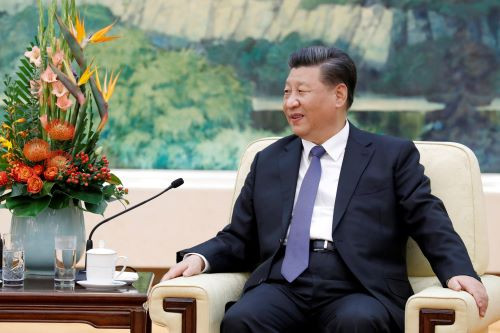Chinese President Xi Jinping projected confidence in China's economic trajectory during his New Year's address, setting a 5% growth target for 2025 despite looming external challenges, including U.S. President-elect Donald Trump's planned tariffs on Chinese imports. Xi emphasized the country's resilience in the face of economic uncertainty while underscoring Beijing's deepening ties with Russia amid a shifting global landscape.
Speaking through the state-run Xinhua news agency, Xi declared that China's economy was "overall stable and progressing," citing achievements in addressing key risks and maintaining employment and price stability. However, he acknowledged the hurdles ahead, including "uncertainty of the external environment" and the need for transitioning growth drivers.
The 5% growth projection aligns with Beijing's official targets and follows a year of policy stimulus aimed at preventing an economic downturn. Measures introduced in late 2024 included aggressive subsidies, borrowing cost reductions, and public sector pay raises. Economists attribute these actions to a modest rebound, estimating 2024 growth at around 4.8%, narrowly avoiding more severe declines.
Xi's remarks come as Trump prepares to impose tariffs on Chinese goods, a move likely to provoke countermeasures from Beijing. Analysts expect restrictions on U.S. companies operating in China, potentially affecting high-profile entities like Tesla, whose CEO Elon Musk became a close advisor to Trump during his campaign. Despite these tensions, Xi remained optimistic, framing the challenges as surmountable with "hard work and cooperation."
China's economic outlook is not without skepticism. Critics argue that official growth figures may be inflated, particularly given the lingering impacts of Beijing's stringent pandemic lockdowns, which stifled consumer spending and business activity. Moreover, the country faces significant headwinds in the property sector, a cornerstone of the economy, with a spate of real estate firm bankruptcies casting a long shadow.
Meanwhile, Xi's address also underscored China's evolving geopolitical alliances. He highlighted Beijing's strategic partnership with Moscow, describing the two nations as moving "hand in hand along the correct path of non-alignment, non-confrontation, and not targeting any third party." This relationship has deepened since the signing of a "new era strategic partnership" in May 2024, focusing on shared interests in Taiwan, Ukraine, and countering U.S. influence.
Russian President Vladimir Putin echoed Xi's sentiments in his own New Year's address, celebrating the strengthening bilateral ties as the countries mark 75 years of diplomatic relations. Putin, however, offered a more somber tone regarding the war in Ukraine, lauding Russian soldiers as "true heroes" but refraining from making battlefield predictions for 2025.
Xi's comments also touched on Taiwan, reiterating Beijing's stance on "reunification" with the island. "No one can sever our family bonds, and no one can stop the historical trend of national reunification," Xi asserted, signaling continued tension in the Taiwan Strait as pro-independence forces remain in Beijing's crosshairs.
Domestically, the Chinese government aims to spur growth by bolstering consumer confidence and private sector investment. Key strategies include incentivizing borrowing and stabilizing financial markets. Public sector pay hikes, reportedly implemented in late 2024, are part of broader efforts to encourage spending and economic recovery.
China's central bank is expected to further ease monetary policies in 2025, while fiscal initiatives are set to prioritize infrastructure development and poverty alleviation. These measures reflect the government's commitment to achieving a 5% growth target, even as global and domestic challenges mount.






